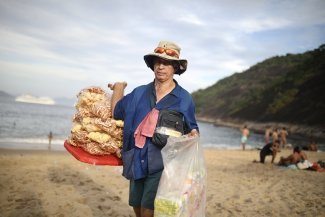Night has fallen on the ’new Jungle’ of Calais. With all the other camps in the city having closed, it is on this piece of land at the end of a dirt track, away from the city centre, that some 3000 asylum seekers, refugees and migrants have been living since April.
They come from Sudan, Eritrea, Ethiopia, Somalia, Afghanistan, Iraq and Syria. Night after night, group by group, they head out of this shantytown, nestled between the sand dunes and the industrial zone. Their objective: to make the ever-more risky journey to the British Eldorado.
Crutches in hand, leg in plaster, twenty-year-old Tesfaldet is waiting in front of a tent in the camp.
He left Eritrea a month ago and has been in Calais less than a week. “On the very first night I tried to cross by clinging on to a train, but I fell,” he explains. Dejected as he may be, the young man vows to try his luck again once he is better.
Since the end of June, the number of injured migrants has rocketed. At least 11 people have died, hit by trains, electrocuted at the entrance of the Channel Tunnel or drowned in Eurotunnel retention basins.
It is something never before seen in the 15-year migratory deadlock in Calais.
The cause: bolstered security in the city’s port. Two months ago, a new four-metre-high fence topped with barbed wire was installed together with barriers along the motorway.
This new security infrastructure, introduced in line with the Franco-British agreement of September 2014, has been financed for the most part by the United Kingdom, to the tune of €15 million (US$16.4 million), and is aimed at preventing migrants from getting on trucks crossing the Channel by ferry.
Since then, the Eurotunnel terminal has become the main crossing point.
To tackle the rise in the number of incursions – 4500 attempts were reportedly thwarted by the police in July – Eurotunnel has mobilised a team of 200 security staff. In addition, 120 riot police and gendarmes have been sent in to reinforce the thousand or so police officers already there.
For its part, the UK is taking an increasingly tough stance against migrants, introducing measures such as additional border control staff, an extra €10 million (US$11 million) to bolster security around the tunnel and measures to facilitate the expulsion of asylum seekers.
David Cameron, the British prime minister, has thus sought to fend off the “swarm of migrants” trying to enter the United Kingdom “because it’s an incredible place to live”.
International emergency operation
Faced with this bolstered security, the migrants are caught between a rock and a hard place.
“The more you increase security, the more accidents there will be, because it does not dissuade them all from trying to cross,” protests a volunteer from the Catholic NGO Caritas France.
Alpha, a Mauritanian architect who reached Calais eight months ago, is “tired”. Sat, staring into space, he tells Equal Times: “The police treat us like animals. They have no respect. I’m not going to try to cross anymore, I want to stay in France.”
Whilst waiting for a response to his asylum request, Alpha has made himself a small wooden house with a garden and a chicken coop. With the passing of time, life in the ’new Jungle’, tolerated by the authorities, is becoming organised.
France refuses to open a permanent structure, for fear of provoking a massive influx of migrants, but it opened the Jules Ferry centre in April. It lodges 130 women and children. The centre, located at the end of the ’new Jungle’ camp, is open to all migrants in the afternoon. It serves 2000 meals a day, has 60 showers, and power outlets for charging mobile phones.
At the end of June, four NGOs, which usually work in areas affected by conflict or natural disasters, decided to launch an unprecedented emergency humanitarian operation in light of the catastrophic sanitary conditions at the camp. Since then, a vital minimum has been provided: four water points, toilets, wood for building shelters and a makeshift clinic.
“We are heading an international emergency humanitarian crisis operation in Calais, because the authorities do not want to deal with it and are insisting on tackling the situation from a security perspective rather than a humanitarian perspective,” says Chloé Lorieux, a volunteer nurse for Médecins du Monde, which has set up the clinic.
Rise in injuries
Based in the centre of the camp, around 15 volunteers – doctors, nurses, psychologists, translators – provide assistance to between 70 and 90 migrants a day. They are already queuing outside the large tent as soon as it opens.
“People come with injuries such as sprains, cuts or fractures linked to attempts to make the crossing or the police violence,” explains Lorieux.
“We have seen a rise in the number of injuries with the bolstered security at the port and the increase in attempts to cross through the tunnel. When the migrants used to go through the port, they would jump on the trucks and wouldn’t fall from as high. This security response is doing nothing but increasing these people’s vulnerability.”
The clinic should only be in place for three months. Lorieux “hopes that by then the authorities will take on their responsibilities, because even the health centres in Calais itself are overwhelmed”.
Heightened security is far from being the only solution. The first one would be to make the asylum process more fluid. Céline Schmitt, spokesperson of the United Nations High Commission for Refugees (UNHCR), explains: “These migrants need international protection. They are refugees who have fled from persecution and countries at war. The must be able to seek asylum, which is still too long a procedure.”
Many of the migrants in Calais have applied for asylum. While awaiting a final response, which may take two years, many continue to try to cross the Channel to Britain.
“The procedures need to be unified throughout Europe. Asylum seekers need to be offered accommodation, which is not often enough the case, and the time it takes to examine applications needs, of course, to be reduced,” says Pierre Henry, head of the French migrants rights NGO France Terre d’Asile.
This is one of the aims of the new asylum law passed at the beginning of July in the National Assembly, in line with European directives. The aim is to reduce the maximum processing time to nine months. “This law is a positive step, but the problem is whether the resources will follow,” adds Henry.
Another solution would be to renegotiate the Franco-British treaties. Signed in 2003, the Touquet Treaty provides that it is France, not the United Kingdom, that handles the filtering of migrants at the border – an arrangement that has become unmanageable.
At the beginning of July, the National Consultative Commission for Human Rights (CNCDH) recommended the condemnation of these agreements, which have led “to making France the “police arm” of British immigration policy.
The CNCDH believe it “amounts, in practice, to forbidding migrants from leaving” France.
“The United Kingdom must be brought back to the negotiating table,” says Henry. He also proposes the opening, in Calais, of a “legal immigration channel between the two countries, with a joint asylum bureau”.
The rise in such tensions across Europe is also the result of member states not yet having adapted to the new migration situation.
As Schmitt points out: “European Union countries must work together and in solidarity as of the moment the migrants set foot in Europe, and not only in Calais, which is just one facet of this European crisis.”









